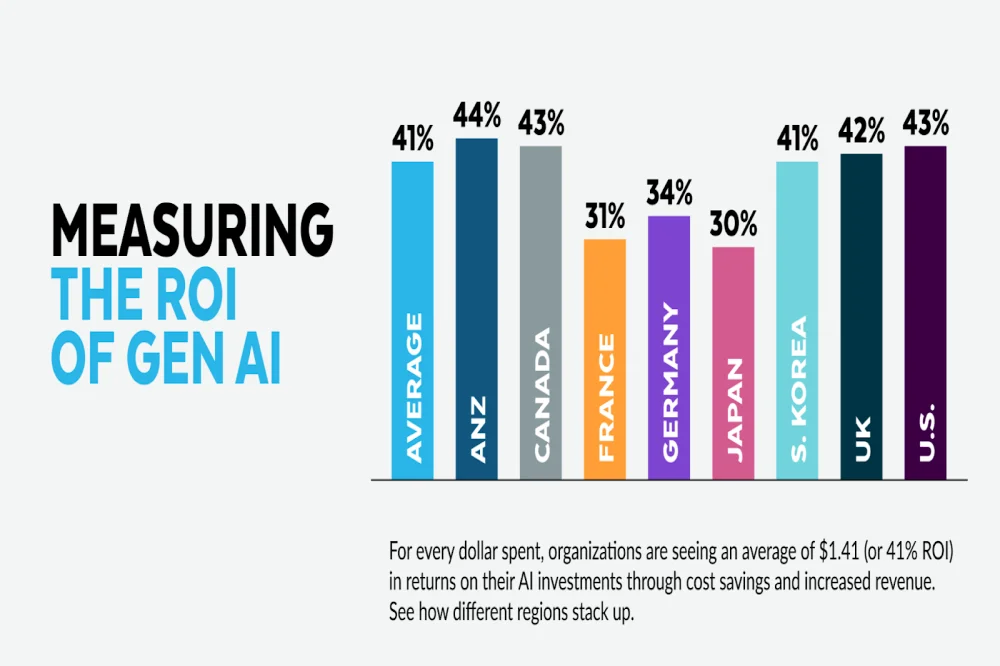Despite already tangible results, French companies struggle to scale up the use of generative AI. The new report "The Radical ROI of Generative AI" by Snowflake highlights measurable return on investment, but still modest budget commitments. Conducted by Enterprise Strategy Group (ESG) on behalf of
Snowflake, the study is based on the responses of 1,900 executives and IT managers in nine countries, including
France. It highlights a global dynamic of GenAI adoption, driven by initial positive results. Thus, 92% of so-called pioneering companies believe their generative AI projects have been profitable, with an average return on investment of 41%.
Use cases are expanding: 70% of respondents report using it in IT operations, 65% in
cybersecurity, 56% in customer support, and 44% in marketing. More than half (55%) prioritize solutions aimed at employees to improve their efficiency, and 88% already notice significant productivity gains.
On the technological front, strategies are strengthening: 96% of pioneering companies assert they are training, adjusting, or enriching their own language models, and 59% plan to deploy at least three within a year. This trend is accompanied by increased complexity: 64% report difficulties in integrating data between silos, and only 11% believe their unstructured data is ready for AI exploitation.
A More Cautious Dynamic in France
In this promising global context,
France shows a more moderate profile. 41% of French companies have launched use cases, a figure slightly above the global average (36%), but which reflects a still experimental phase. The average declared ROI is 31%, and only 9% of companies plan to allocate more than 25% of their technological budget to generative AI, compared to 25% in the rest of the world.
The use of advanced tools is also lagging:
-
59% of French companies use techniques like retrieval-augmented generation (RAG), compared to 71% globally;
-
52% allow natural language queries, compared to 66% worldwide.
A Recognized but Underutilized Innovation Lever
Despite this cautious approach, French companies do not question the potential of GenAI: 91% believe it enhances their innovation capacity, a rate higher than the global average (84%).
Paradoxically, technical challenges are perceived as less restrictive: 33% mention a lack of diversity in unstructured data (compared to 42% internationally), and 42% cite data silos as an obstacle, against 64% in other countries. A situation that can be explained by the lower intensity of currently conducted projects, but which could evolve rapidly with an increase in usage.
Scaling Up: A Strategic Imperative
To not fall behind in the generative AI race, French companies are now facing a strategic equation: industrialize usage, enhance skills, and invest more. Thomas Gourand, VP & Country Manager
France of
Snowflake, cites the distributor ManoMano as an example:
"Our client ManoMano, for example, has already seen 80% of its AI use cases move into production, and artificial intelligence is present in 85% of the user journey on our platforms, clear proof that beyond innovation, generative AI already has a measurable and critical impact for the company."
The exploitation of unstructured data, the maturity increase of proprietary models, governance, and security around autonomous agents are all projects to address in order to sustainably integrate generative AI into the
business processes of French companies.
To better understand
What is Generative Retrieval Augmentation (RAG), and how does it integrate into corporate data strategies?
Generative Retrieval Augmentation (RAG) is a technique combining AI-generated data with information retrieval from both structured and unstructured databases. It enhances the accuracy and completeness of responses by integrating advanced language and AI techniques into corporate information management systems.
What are the main regulatory challenges associated with the adoption of generative AI by companies?
Regulatory challenges include data privacy protection, algorithm transparency, and liability issues for biases or decisions made by AI. Compliance with regulations such as the GDPR in Europe is crucial to ensure AI use respects individual rights.



